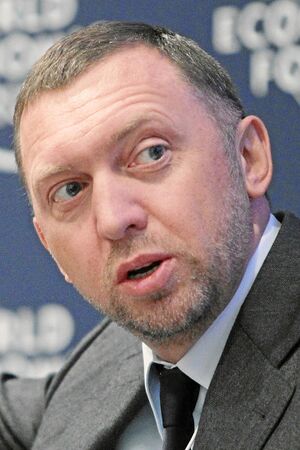Oleg Deripaska
(billionaire, businessman) | |
|---|---|
 | |
| Born | Oleg Vladimirovich Deripaska 2 January 1968 Dzerzhinsk, Nizhny Novgorod Oblast, Russian SFSR |
| Citizenship | Russia Cyprus |
| Alma mater | Moscow State University, Plekhanov Russian Academy of Economics |
| Children | 2 |
| Spouse | Polina Deripaska |
| Member of | Russia/Deep state, WEF/Global Leaders for Tomorrow/2000 |
Oleg Deripaska is a Russian, oligarch. Daniel Hopsicker writes that "New evidence indicates that Oleg Deripaska, the Russian billionaire who paid $10 million a year to Paul Manafort between 2004 and 2009".[1]
Related Quotation
| Page | Quote | Date |
|---|---|---|
| 2023 | “Last week’s indictment of McGonigal is a classic case of raising more questions than were answered. The evidence presented by prosecutors suggests the FBI counterintelligence expert wasn’t introduced to Deripaska until his waning days with the bureau in 2018, aided by a pair of Russian diplomats. In 2019, after he’d retired, the indictment says McGonigal went to work for the oligarch to help him evade U.S. sanctions and to investigate a rival. But the Times also reported that U.S. counterintelligence — in which McGonigal had been a key player — had tried unsuccessfully to recruit Deripaska as an asset in the years around the 2016 election.
Like the Woody Allen character Zelig, Deripaska — a 55-year-old aluminum magnate who at one time was the richest man in Putin’s Russia — is turning up in the background everywhere in the ongoing corruption of American democracy. The oligarch’s history of multimillion-dollar business dealings with Paul Manafort — Trump’s campaign manager in the summer of 2016 — is central to the theory of Russian interference, after it was confirmed that Manafort shared key campaign data with a suspected Russian intelligence agent also connected to Deripaska. In 2019, Deripaska did manage to get those U.S. sanctions lifted, in a controversial deal backed not only by Team Trump but critically by then-Senate Majority Leader Mitch McConnell. That same year, a Deripaska-linked aluminium company announced it would build a large plant in Kentucky, where McConnell was running for re-election. (It eventually wasn’t built.) This is the same McConnell who, during that critical fall period in 2016, refused to sign a bipartisan statement warning about Russian election interference.” | January 2023 |
Events Participated in
| Event | Start | End | Location(s) | Description |
|---|---|---|---|---|
| Munich Security Conference/2013 | 1 February 2013 | 3 February 2013 | Germany Munich Bavaria | The 49th Munich Security Conference |
| Munich Security Conference/2015 | 6 February 2015 | 8 February 2015 | Germany Munich Bavaria | "400 high-ranking decision-makers in international politics, including some 20 heads of state and government as well as more than 60 foreign and defence ministers, met in Munich to discuss current crises and conflicts." |
| Munich Security Conference/2016 | 12 February 2016 | 14 February 2016 | Germany Munich Bavaria | The 52nd Munich Security Conference |
| Munich Security Conference/2017 | 17 February 2017 | 19 February 2017 | Germany Munich Bavaria | The 53rd Munich Security Conference |
| Munich Security Conference/2018 | 12 February 2018 | 14 February 2018 | Germany Munich Bavaria | The 54th Munich Security Conference |
| Munich Security Conference/2019 | 15 February 2019 | 17 February 2019 | Germany Munich Bavaria | The 55th Munich Security Conference, which included "A Spreading Plague" aimed at "identifying gaps and making recommendations to improve the global system for responding to deliberate, high consequence biological events." |
| Munich Security Conference/2022 | 18 February 2022 | 20 February 2022 | Germany Munich Bavaria | Slightly less than 1/3 of the 664 of the participants have pages here |
| WEF/Annual Meeting/2007 | 24 January 2007 | 28 January 2007 | Switzerland | Only the 449 public figures listed of ~2200 participants |
| WEF/Annual Meeting/2009 | 23 January 2009 | 27 January 2009 | World Economic Forum Switzerland | Chairman Klaus Schwab outlined five objectives driving the Forum’s efforts to shape the global agenda, including letting the banks that caused the 2008 economic crisis keep writing the rules, the climate change agenda, over-national government structures, taking control over businesses with the stakeholder agenda, and a "new charter for the global economic order". |
| WEF/Annual Meeting/2011 | 26 January 2011 | 30 January 2011 | World Economic Forum Switzerland | 2229 guests in Davos, with the theme: "Shared Norms for the New Reality". |
| WEF/Annual Meeting/2012 | 25 January 2012 | 29 January 2012 | Switzerland | 2113 guests in Davos |
| WEF/Annual Meeting/2013 | 23 January 2013 | 27 January 2013 | World Economic Forum Switzerland | 2500 mostly unelected leaders met to discuss "leading through adversity" |
| WEF/Annual Meeting/2014 | 22 January 2014 | 25 January 2014 | World Economic Forum Switzerland | 2604 guests in Davos considered "Reshaping The World" |
| WEF/Annual Meeting/2016 | 20 January 2016 | 23 January 2016 | World Economic Forum Switzerland | Attended by over 2500 people, both leaders and followers, who were explained how the Fourth Industrial Revolution would changed everything, including being a "revolution of values". |
| WEF/Annual Meeting/2017 | 17 January 2017 | 20 January 2017 | World Economic Forum Switzerland | 2950 known participants, including prominently Bill Gates. "Offers a platform for the most effective and engaged leaders to achieve common goals for greater societal leadership." |
| WEF/Annual Meeting/2020 | 21 January 2020 | 24 January 2020 | World Economic Forum Switzerland | This mega-summit of the world's ruling class and their political and media appendages happens every year, but 2020 was special, as the continuous corporate media coverage of COVID-19 started more or less from one day to the next on 20/21 January 2020, coinciding with the start of the meeting. |